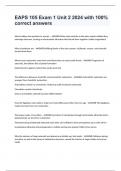Exam (elaborations)
EAPS 105 Exam 1 Unit 2 2024 with 100% correct answers
- Course
- Institution
EAPS 105 Exam 1 Unit 2 2024 with 100% correct answers What enables dust particles to accrete. - ANSWER-When dust particles in the solar nebula collided they exchange electrons, causing an electrostatic attraction that bound them together (called coagulation) What chondrules are. - ANSWER-Bu...
[Show more]



